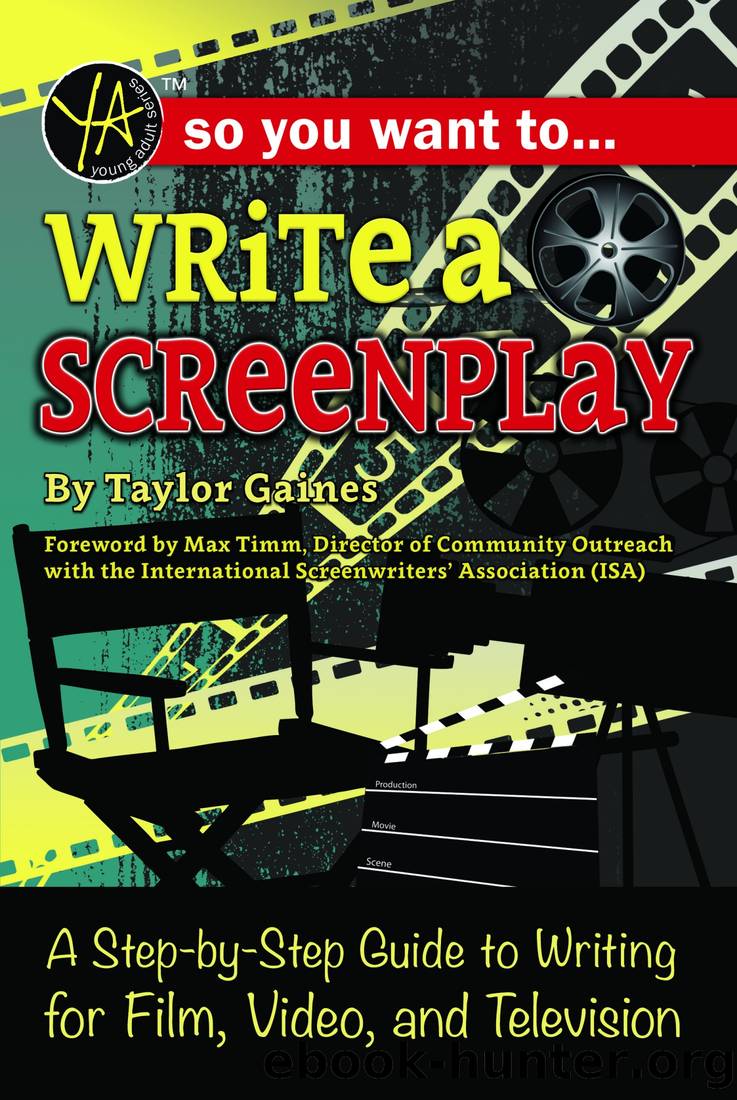So You Want to Write a Screenplay by Taylor Gaines

Author:Taylor Gaines [Gaines, Taylor]
Language: eng
Format: epub
Publisher: Atlantic Publishing Group Inc
Published: 2016-12-09T11:20:34+00:00
These are the kinds of images and shots that will stick with you well after you leave the theater.
Plot point two
In this part, the stakes should be raised to their highest point, and the action should push the characters in yet another surprising direction. This time, our protagonist will either hit a new low or reach a new high â maybe even a false one. If there is a time element in your film, plot point two is a good time to remind the audience and add some pressure to the story. A classic example that youâve probably seen is the kind where a character realizes he or she is in love with another character who is on their way to the airport to leave forever. He or she has to get there before the flight leaves!
Second act issues
Sustaining suspense throughout the middle of a story can be notoriously difficult. The pacing of the movie can easily get screwed up because the second act is so much longer than the other two acts. Changing the tone or pacing of the movie too much can leave the audience feeling jarred and dissatisfied.
For instance, Hancock (2008) features Will Smith as an alcoholic superhero. As the movie begins, he saves an executive named Ray from being crushed by a train. This leads Ray to try to help Hancock rehabilitate his image. Rayâs wife, Mary, still feels like most of the city distrusts Hancock. In the second act, the story changes dramatically after Mary reveals to Hancock that she is also a superhero and his former lover. The movie goes from being a dark comedy about a gruff superhero to being a romance about star-crossed lovers reuniting after 80 years apart. This confused many viewers, because they felt like they were watching two different movies.
You also need to make sure that your protagonist is a constant presence in your second act, on screen or not, to ensure the tone of the movie stays steady. Donât go more than a couple scenes without addressing the main storyline.
Act 3: The resolution
Wrapping up your story is always going to be a difficult and unique challenge. The protagonist is bound to be at a turning point in his or her life. Your character will often take one last shot at the things that he or she wants. Sometimes, they will do so armed with new information or skills that they believe will make them successful. Other times, the protagonist will have no choice but to face the issue because someone else has confronted them with it.
The third act will include the climax and probably run from about page 70 to page 100. Make sure to leave room in the last few pages of your screenplay to wrap up any loose ends and ensure the audience will be satisfied that the story is resolved.
Schadenfreude
Schadenfreude is a German word that refers to the pleasure one gets from seeing someone elseâs misfortune. The question is: Why is schadenfreude so prevalent in movies, and why do we enjoy watching other people suffer?
The answer is still up for debate.
Download
This site does not store any files on its server. We only index and link to content provided by other sites. Please contact the content providers to delete copyright contents if any and email us, we'll remove relevant links or contents immediately.
Machine Learning at Scale with H2O by Gregory Keys | David Whiting(4314)
Never by Ken Follett(3960)
Fairy Tale by Stephen King(3401)
Oathbringer (The Stormlight Archive, Book 3) by Brandon Sanderson(3222)
Reminders of Him: A Novel by Colleen Hoover(3123)
Will by Will Smith(2924)
Once Upon a Broken Heart by Stephanie Garber(2864)
Never Lie: An addictive psychological thriller by Freida McFadden(2630)
Fantastic Beasts and Where to Find Them: The Original Screenplay by J. K. Rowling(2518)
Can't Hurt Me: Master Your Mind and Defy the Odds - Clean Edition by David Goggins(2344)
The Dark Hours by Michael Connelly(2312)
Friends, Lovers, and the Big Terrible Thing by Matthew Perry(2234)
The Becoming by Nora Roberts(2207)
Love on the Brain by Ali Hazelwood(2080)
Principles for Dealing With the Changing World Order: Why Nations Succeed and Fail by Ray Dalio(2058)
A Short History of War by Jeremy Black(1851)
The Strength In Our Scars by Bianca Sparacino(1847)
The Complete Witcher by Andrzej Sapkowski(1843)
Cytonic by Brandon Sanderson(1836)
